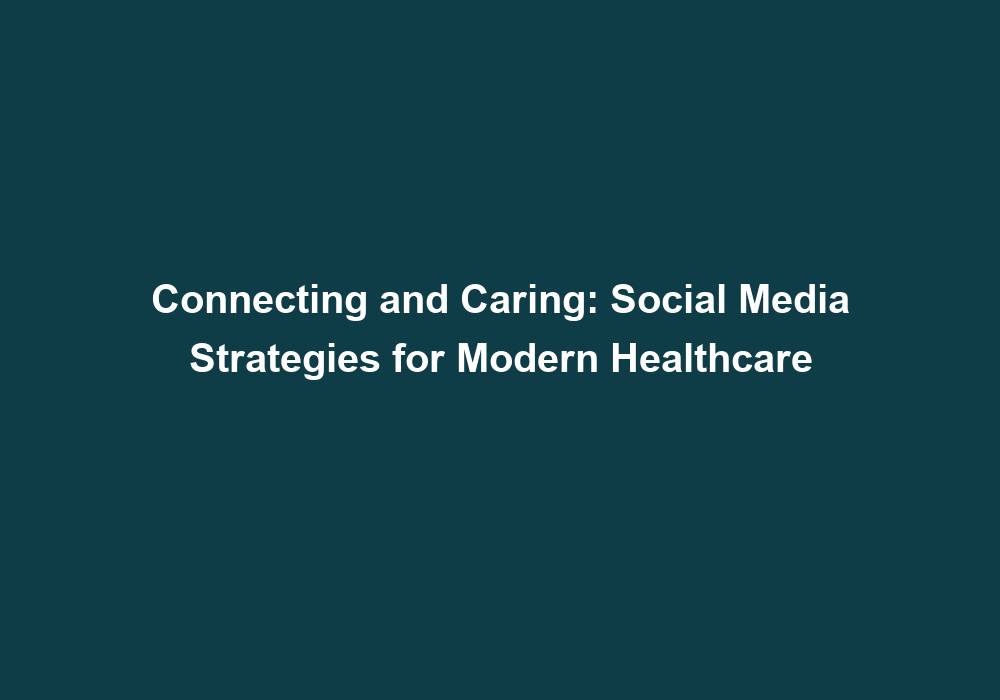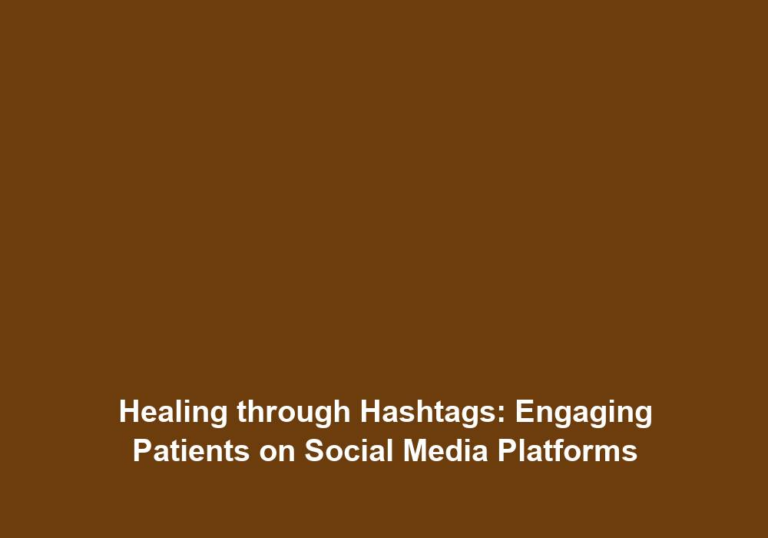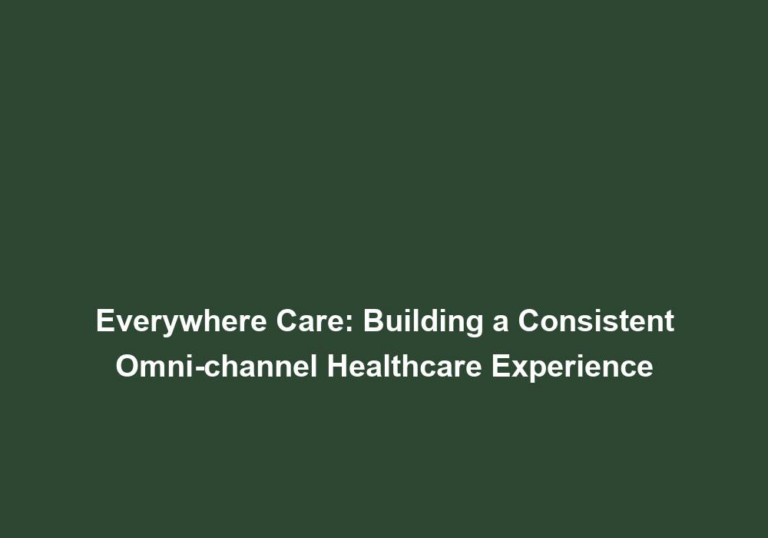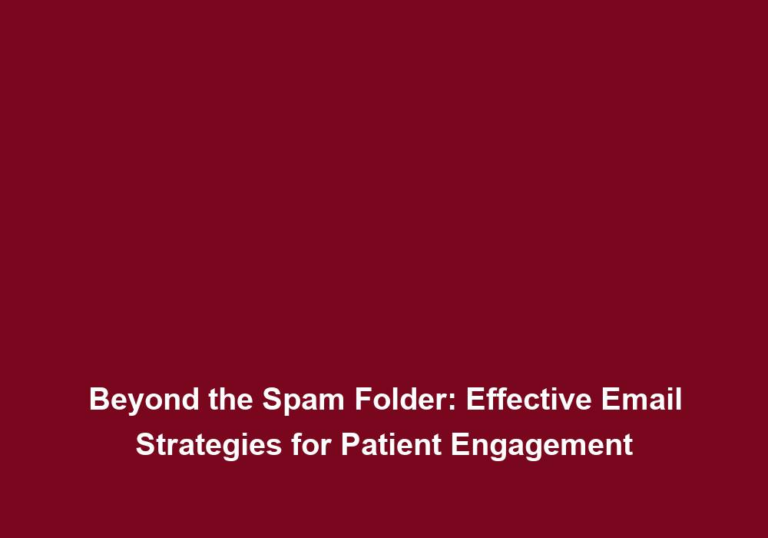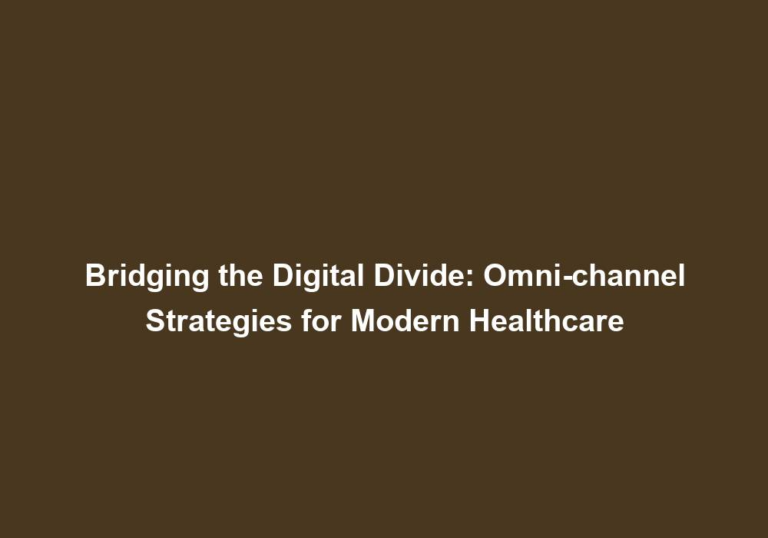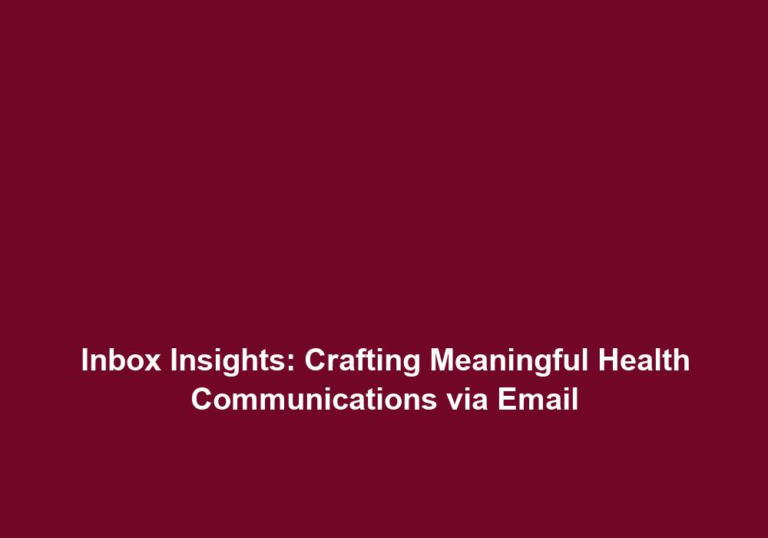Connecting and Caring: Social Media Strategies for Modern Healthcare
In today’s modern world, social media has become an integral part of our daily lives. It has revolutionized the way we communicate, connect, and share information. With its immense popularity and widespread reach, social media platforms offer a unique opportunity for the healthcare industry to connect with patients, share valuable information, and provide support.
The Power of Social Media in Healthcare
Social media platforms such as Facebook, Twitter, Instagram, LinkedIn, and YouTube have billions of active users worldwide. These platforms allow healthcare organizations, hospitals, clinics, and individual healthcare professionals to reach a vast audience and engage with them on a personal level.
Benefits of Social Media in Healthcare
- Enhancing patient engagement: Social media platforms provide an avenue for healthcare providers to interact with patients in real-time. By responding to queries, sharing educational content, and providing support, healthcare professionals can actively engage with patients and foster a sense of trust and reliability.
-
Responding to queries promptly: Through social media, healthcare providers can address patient concerns and answer their questions in a timely manner. This immediate response helps patients feel valued, heard, and attended to, leading to enhanced engagement.
-
Sharing educational content: Social media platforms allow healthcare professionals to share informative articles, videos, and infographics with their audience. By providing valuable and relevant content, healthcare providers can educate patients about preventive care, disease management, and healthy lifestyles.
-
Providing support: Social media enables healthcare organizations to offer round-the-clock support to patients. By addressing concerns, answering questions, and providing timely assistance, healthcare professionals can improve patient satisfaction and overall experience.
- Building a strong online presence: Social media allows healthcare organizations to create and maintain an online presence, enabling them to establish credibility and foster brand awareness. By regularly sharing informative and relevant content, healthcare providers can position themselves as thought leaders in their respective fields.
-
Regularly sharing content: Healthcare organizations can use social media platforms to share articles, blog posts, videos, and other content that showcases their expertise. By consistently providing valuable information, healthcare providers can establish themselves as trusted sources of knowledge.
-
Engaging with the audience: Social media provides an opportunity for healthcare professionals to interact with their audience through comments, messages, and discussions. By actively engaging with their followers, healthcare organizations can build relationships, gain valuable insights, and create a sense of community.
-
Showcasing success stories: Social media platforms allow healthcare providers to share success stories and patient testimonials. By highlighting positive outcomes and experiences, healthcare organizations can build trust and credibility among their audience.
- Educating and empowering patients: Social media platforms provide an excellent opportunity to educate patients about preventive care, disease management, and healthy lifestyles. By sharing informative articles, videos, and infographics, healthcare professionals can empower patients to take control of their health and make informed decisions.
-
Sharing informative articles and resources: Healthcare organizations can utilize social media platforms to share articles, blog posts, and other resources that provide information on various health topics. By offering valuable insights, healthcare professionals can help patients make informed decisions about their health.
-
Promoting healthy lifestyles: Social media can be used to promote healthy habits and lifestyles. Healthcare providers can share tips, advice, and success stories related to exercise, nutrition, mental health, and overall well-being. By inspiring and motivating patients, healthcare organizations can empower them to adopt healthier habits.
-
Providing disease management guidance: Social media platforms offer an opportunity for healthcare professionals to share information on managing different diseases and conditions. By providing guidance, tips, and resources, healthcare organizations can support patients in effectively managing their health.
- Promoting healthcare services and events: Social media platforms serve as powerful promotional tools for healthcare organizations. Whether it’s promoting a new service, announcing a health campaign, or advertising an upcoming event, social media allows healthcare providers to reach a larger audience quickly and cost-effectively.
-
Promoting new services: Healthcare organizations can utilize social media platforms to create awareness about new services they offer. By showcasing the benefits and features of these services, healthcare providers can attract potential patients and increase their reach.
-
Announcing health campaigns: Social media provides a platform for healthcare organizations to announce and promote health campaigns aimed at raising awareness about specific health issues. By leveraging the reach of social media, healthcare providers can ensure that their campaigns reach a wide audience.
-
Advertising events: Social media platforms allow healthcare organizations to advertise and promote events such as health fairs, workshops, and seminars. By creating event pages, sharing event details, and using targeted advertising, healthcare providers can maximize event attendance and participation.
- Improving patient support and satisfaction: Social media platforms enable healthcare organizations to provide round-the-clock support to patients. By addressing concerns, answering questions, and providing timely assistance, healthcare professionals can enhance patient satisfaction and improve overall patient experience.
-
Addressing concerns promptly: Social media allows healthcare providers to respond to patient concerns and complaints in a timely manner. By addressing these issues promptly and effectively, healthcare organizations can demonstrate their commitment to patient satisfaction.
-
Answering questions and providing information: Social media provides an avenue for patients to ask questions and seek information. By actively engaging with patients and providing accurate and helpful responses, healthcare professionals can improve patient support and satisfaction.
-
Offering personalized assistance: Social media platforms enable healthcare organizations to provide personalized assistance to patients. By addressing individual concerns and offering tailored advice, healthcare professionals can enhance the patient experience and build trust.
Effective Social Media Strategies for Healthcare
To make the most out of social media in the healthcare industry, it’s essential to develop and implement effective strategies. Here are some key strategies to consider:
1. Define Your Goals and Target Audience
Before diving into social media, it’s crucial to define your goals and identify your target audience. Are you looking to increase brand awareness, drive website traffic, or enhance patient engagement? Understanding your goals will help guide your content creation and engagement strategies. It’s also essential to identify your target audience to tailor your content and messaging accordingly.
-
Increasing brand awareness: If your goal is to increase brand awareness, focus on creating content that showcases your expertise, values, and unique offerings. Use social media platforms to reach a wider audience and create a positive brand image.
-
Driving website traffic: If your objective is to drive website traffic, include links to your website in your social media posts. Use engaging and compelling content to encourage users to click on these links and explore your website further.
-
Enhancing patient engagement: If your aim is to enhance patient engagement, prioritize interactive content such as polls, quizzes, and discussions. Encourage your audience to participate and share their thoughts, opinions, and experiences.
2. Create High-Quality and Engaging Content
To attract and retain followers, it’s essential to create high-quality and engaging content. This includes informative articles, videos, infographics, and patient testimonials. Your content should be relevant, informative, and easy to consume. Infographics and videos can be particularly effective in conveying complex medical information in a visually appealing and easily understandable manner.
-
Informative articles: Share articles that provide valuable insights, tips, and information on various health topics. Ensure that your articles are well-researched, accurate, and up-to-date.
-
Videos: Create videos that educate, inspire, and entertain your audience. Consider producing videos that address frequently asked questions, showcase patient success stories, or provide tips for maintaining good health.
-
Infographics: Utilize infographics to present complex medical information in a visually appealing and easy-to-understand format. Use clear visuals, concise text, and relevant statistics to convey your message effectively.
-
Patient testimonials: Share stories and testimonials from satisfied patients to build trust and credibility. Highlight the positive outcomes and experiences your patients have had under your care.
3. Utilize Visual Storytelling
Visual storytelling is a powerful tool in social media marketing. Use compelling visuals such as images and videos to tell stories that resonate with your audience. Whether it’s showcasing successful patient outcomes, behind-the-scenes glimpses of your healthcare facility, or testimonials from satisfied patients, visual storytelling can help create a strong emotional connection.
-
Showcasing successful patient outcomes: Share before-and-after photos, success stories, and testimonials to demonstrate the positive impact your healthcare services have had on patients’ lives. Use visuals to convey the transformation and improvement patients have experienced.
-
Behind-the-scenes glimpses: Offer a behind-the-scenes look at your healthcare facility to humanize your brand and create a sense of transparency. Share photos and videos that highlight the dedication, expertise, and compassion of your healthcare professionals.
-
Testimonials from satisfied patients: Feature video testimonials or quotes from patients who have had a positive experience with your healthcare organization. These testimonials can help build trust and credibility among your audience.
4. Engage and Interact with Your Audience
Social media is all about interaction and engagement. Respond to comments, questions, and messages promptly. Encourage discussions, ask for opinions, and create polls to actively involve your audience. Engaging with your followers not only helps build trust but also provides valuable insights into their needs and preferences.
-
Responding to comments and messages: Monitor your social media platforms regularly and respond to comments, messages, and inquiries in a timely manner. Show genuine interest and provide helpful and accurate information.
-
Encouraging discussions: Pose thought-provoking questions or initiate discussions on relevant health topics. Encourage your audience to share their opinions, experiences, and tips. Respond to their comments and engage in meaningful conversations.
-
Creating polls and surveys: Use polls and surveys to gather feedback from your audience. Ask them about their preferences, interests, and needs. This information can help you tailor your content and services to better meet their expectations.
5. Collaborate with Influencers and Partners
Influencer marketing can be a powerful strategy to amplify your reach and credibility. Collaborate with influencers in the healthcare industry who have a significant following and align with your values. Additionally, consider partnering with other healthcare organizations or non-profit associations to cross-promote each other’s content, events, or campaigns.
-
Influencer collaborations: Identify influencers in the healthcare industry who have a strong online presence and a loyal following. Collaborate with them to create content, promote your services, or raise awareness about specific health issues.
-
Cross-promotion with partners: Build partnerships with other healthcare organizations or non-profit associations that share similar values and goals. Cross-promote each other’s content, events, or campaigns to reach a wider audience and leverage each other’s networks.
6. Use Analytics to Measure and Optimize
To track the effectiveness of your social media efforts, utilize analytics tools provided by each platform. Monitor key metrics such as engagement rate, reach, and website traffic. Analyzing this data will help you understand what content performs well, identify areas for improvement, and optimize your social media strategy accordingly.
-
Engagement rate: Monitor the engagement rate of your social media posts, including likes, comments, shares, and clicks. Identify the types of content that generate the highest engagement and focus on creating more of it.
-
Reach: Keep track of the reach of your social media posts to understand how many people are seeing your content. Identify the factors that contribute to higher reach, such as using relevant hashtags, tagging influential accounts, or sharing content at optimal times.
-
Website traffic: Measure the amount of website traffic generated through your social media channels. Analyze the sources of traffic and the behavior of visitors on your website. Use this data to optimize your social media posts and drive more targeted traffic to your website.
Final Thoughts
In the rapidly evolving landscape of healthcare, social media has emerged as a powerful tool for connecting with patients, sharing information, and building relationships. By leveraging the benefits of social media and implementing effective strategies, healthcare organizations can enhance patient engagement, improve brand awareness, and provide valuable support. Embrace the power of social media and unlock its potential for modern healthcare.

